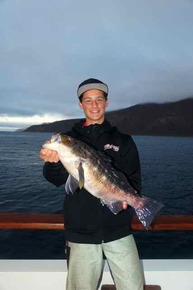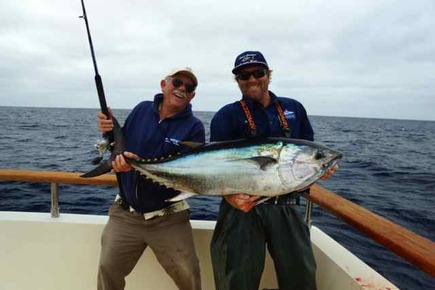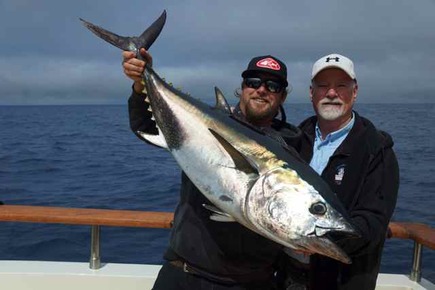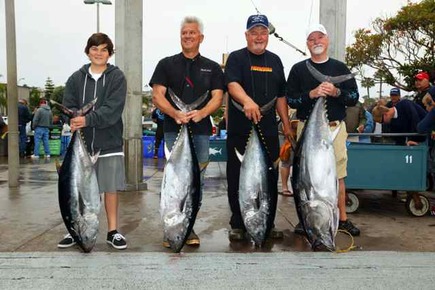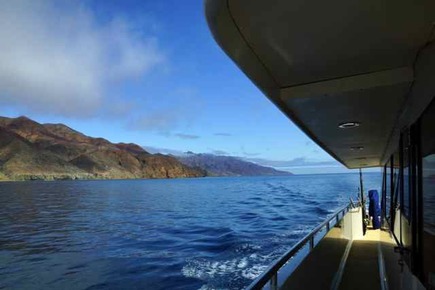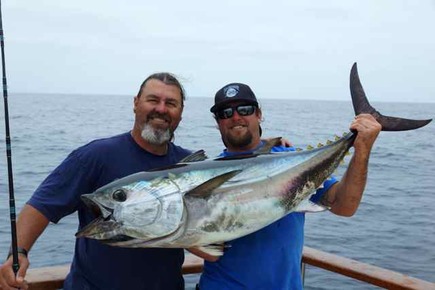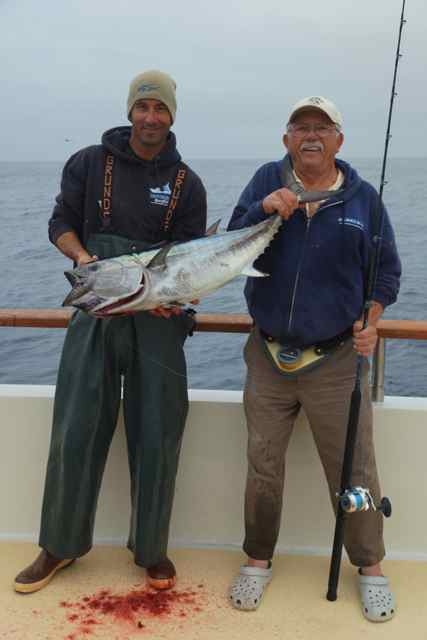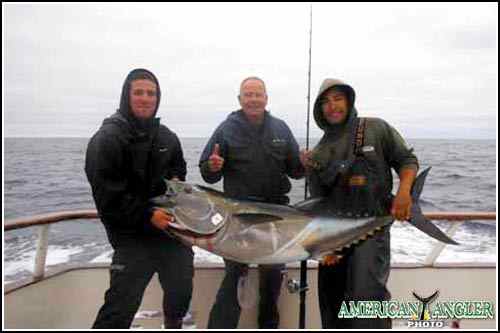Long Range Fish Report
From Sportfishing
From Sportfishing
Fish Report for 6-18-2013
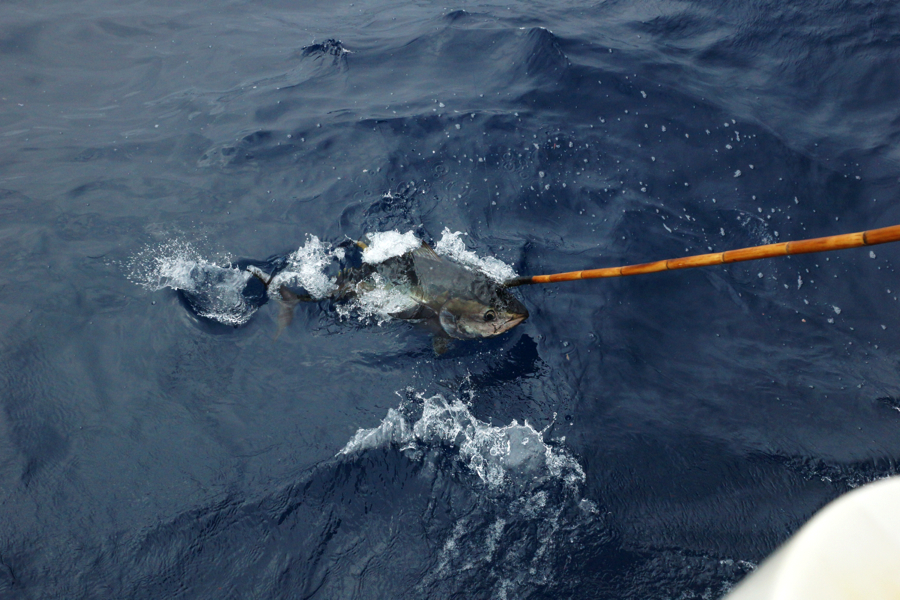
Bill Roecker recounts his recent trip aboard the Intrepid -- This is what a Long Range trip is like
6-18-2013
Bill Roecker
https://www.intrepid.net
We saw lots of yellowtail at Cedros, but they didn't bite for us. We tried the South End, from the salt plant all the way round to Cabo San Augustine, where the wind was whipping around the southwest end so hard it was tough to stand in it and fish. As we neared Augustine, we passed Mark Pisano and his Independence, tucked in against the beach. I shot some nice scenics of the Indy and hoped Mark was getting more action than we found.
The sun was out, and if the fish had cooperated we'd have stayed to make a catch, but after a couple of hours skipper Kevin Osborne made his decision. "We're going to go over to Benitos and give it a try," he told us on the PA. "This isn't going to get it."
I was ready to bungee down in all that wind, but was surprised to see the velocity drop off as we moved away from the big island. Out in the strait it was only blowing about eight knots. In a couple of hours we had nearly reached East Benitos, when we found many bird schools and spread out porpoise about a mile or less from the shore. We could see breaking yellowtail in the commotion. We chased several bunches, only to have the snooty yellows act like bluefin and turn up their noses at us and our sardines and jigs.
"We'll move inside," said Osborne. "Maybe they'll act better near some structure to hold them." And they did. It was a scratch for sure, but we caught some fish before dinner on the windward side of East Benitos, and then anchored for dinner and a smooth nighttime anchorage in the lee of West Benitos. We were back under the marine layer out here, but the scenery was great, with clouds on the top and a rainbow in the mist behind us.
"The Yellowtail did not bite like we had hoped for," wrote Osborne, "although we found some very big spots of them in the afternoon up breezing around and chasing small fin bait everywhere. It was quite impressive to say the least, but frustrating to not get them to chew. It is only a matter of time when this place is going to go off with some incredible fishing from the sign we saw this evening."
That night those who were keen (the two boys and their dads, along with some hardcore) stayed up to fish into the wee hours. They were rewarded with some lunker calico bass, sheephead, whitefish and the like. Cole Chaviriz told me the next morning he'd beat his personal record more than once that night, with some bass approaching ten pounds, Photo #1. That's big, even for Benitos.
In the morning we went back to where we'd got 'em to nibble the day before, and caught yellowtail of six to 22 pounds or so. It wasn't a strong bite, but you could catch a few on bait or jigs if you were wanted. The breeze wasn't strong, so after lunch the skipper made another decision to move back up into the area where we'd had our best bluefin success.
Lunch was also a success, Philly cheesesteak sandwich on Chibata bread with sweet potato fries. Dinner was breaded veal with grilled zucchini and roasted mushrooms. I could feel the weight coming on. At 3:30 A.M. there were bluefin under the boat, showing on the sonar. The skipper shut it down and took a shot at the fish himself, putting three 50-pounders on the deck and handing one off. Anglers filtered up on deck slowly, but by gray light most were out there, occasionally connecting with the 30 to 50-pounders on jigs and bait. I shot video and photos for a while, ate breakfast and then went out to give it a try.
The first bait I threw out off the upwind corner swam mightily, and was eaten before I followed it four steps. There was nothing special about it except that the bait was hot, or maybe scared to death. It was a large sardine on a 3/0 ringed Mustad J hook tied to 40-pound Seaguar Premier fluorocarbon and 60-pound Line One blue spectra on an Accurate Boss Extreme 500 N reel mounted on a seven-foot graphite rod.
I had some fun with that fast little 30-pounder and decked it in just a few minutes. My short topshot wasn't frayed and the hook still looked good, so I pinned on another sardine and pitched it to the same upwind corner. This bait, another hot one, might have made it 20 yards out before it was bit and I could tell by the run I was on a heavier tuna.
Heavier means longer, when it comes to tuna, and after ten minutes this one wasn't close to quitting. But it was down 200 feet and circling, and in another five minutes I could see it, maybe 40 feet down and shining like blue chrome. I was sweating but not out of steam or breath, feeling pleased to get two fish on two casts. That may have been hubris, because a minute later, when I could see the fish well enough to call it a 50-pounder, the hooked pulled out.
So rebuked, I tried a dozen more baits, hooked for, aft and topside with no more bites save for one bait that got bumped and came in with tooth marks on its flank. After an hour, I felt guilty enough to pick up the camera again and go back to work as a journalist/videomaker. I might say here that the camera had only arrived two days before we left, and I was still getting used to the beast with a shotgun microphone mounted atop. The Sony a77 has 24 megapixels and a big 72 mm lens meant to use for both photos and HD video on a high-speed, 32 gig Sony SDHC card. Bigger and heavier than my old one, it's nowhere near as heavy as my dedicated videocam, and a joy to use for both purposes with the push of a button, though I may be ahead of myself again; I haven't tried to edit the video yet. When I do I hope and expect to get a DVD of the trip.
I shot most of the day, as there always seemed to be a good bluefin going somewhere on the boat. There were many exciting moments at gaff, and the usual percentage of tuna were hooked and lost. John Keeler seemed to have one going the whole time, though I did see him resting his eyes in his portable chair during a couple of slow periods. Young Cole got his share, too.
After a lunch of roast turkey, bacon and avocado sandwiches I went to the upper deck to get some footage and photos from the high angle, I spotted three young albatross sitting on the water upswell. They were less than ten feet apart. Something was shining among them, finning. It was four molas, giant sunfish. I made sure to get video of that event, something I hadn't seen before. The close-knit group seemed respectful on one another, though I did see a bird startle briefly when a mola appeared to touch it with a fin.
At 3:30 P.M. I went back to fishing. I went through a couple of lackluster baits and then found another willing sardine. I let it go way out, gave it all the line it wanted, and got a tuna connection far upswell. This one was a bigger fish, and took some three-quarters of the spectra on my spool. Finally the tuna stopped running and went back across the stern. I gained a tiny amount of spectra back.
Then the Fish From Heck, as I began to call it, went to the bow, came up near the surface so far out I couldn't see it, and then went back to the stern again. It sounded, but never circled, not once during the encounter. It just changed direction, depth, speed and location. After 20 minutes of gaining and losing small amounts of line I asked my new best friend, crewman Chad Smith, for help.
Chad had no idea of what he was in for. He can pull hard, but we were limited by the 40-pound strength of the leader and the amount of drag we could put on it. The fish from heck seemed to enjoy our predicament, the way a female sea lion enjoyed a yellowtail it grabbed at boatside back at Benitos. I'll never forget the look she gave us when we ripped the fish from her mouth. Angler Tim Carpenter proved himself a gracious and compassionate angler and put the chewed fish back in the water, where a bull had it momentarily, until "Mama" came back and took it from him. He was a smart old bull; he gave it up.
Chad could put line on the reel, but the tuna could remove it at will. That will didn't include sounding and circling. I spelled my new best pal a couple of times but couldn't get a strong handle on the Fish From Heck. When Chad got it close enough to see some 40 minutes later the bluefin adopted a new tactic, diving under the boat. We got help from Dave Taylor, who used a fork and a gaff handle to ward it off Intrepid's steel hull. We needed that help a half-dozen times, on three sides of the boat, but at last the battle was won at 4:30 and I had a tuna of satisfying size on the deck. Smith and I posed with it, and then it was purged, disgorging at least two pounds of red crab and a half-dozen sardines. Spiked, gilled and gutted, it went into the refrigerated seawater hold properly prepared, as all the fish are these days on Intrepid. Back home, the Fish From Heck weighed in at 58-plus pounds, see PHoto #2. We fished on, enjoying the plunk as long as it lasted, until 7:30, when we drifted into colder water and the fish left. It was the longest bluefin drift, 14 hours, I'd ever been a part of, and I think we may have covered 19 miles or so, with the same bunch of tuna around us. We then celebrated our big day with coffee-rubbed flatiron steak, yam mash and brussel sprouts prepared with bacon, onion, lemon and Parmesan. As he did every night, top angler John Keeler offered another of his fine wines to go with the cuisine.
Here's how the skipper reported it.
"All Day Drift... We got on a school in the dark this morning and shut down on them. It took a little while for them to come back around, but they did get under us and at 4:30am we hooked into the first Jig fish. By daylight (grey) there were nine of the 40 to 60-pound Bluefin on deck. We then began to plunk away at the beautiful grade of Tuna for the rest of the day. Quality Bluefin, caught plunker style, all day long. John Keeler, Photo # 3 was again the hot stick, catching many fat Bluefin, Cole Chivira also boated his share today and everyone else caught plenty."
We spent our last morning picking up yellowtail from the kelps at the north end of the bluefin area, where a couple of boats on day and half trips were also working. We came across at least two schools of bluefin that wouldn't rise or bite. Most of us were still fatigued from the monster drift the previous day. Then we headed for San Diego and put away the rods and reels so the crew could wash down the boat. That evening we enjoyed our stabilized ride and a lobster-steak dinner served to us by skipper Kevin. He and chartermaster Jim Ptacnik got applause for their efforts to make this a very nice trip.
Kevin weighed the contenders at the dock. Jim Kastorff stood in with the winners as honorable mention with his 112-pound bluefin. John Keeler was first with a 56.2-pounder; Mitch Chivira second for a 55.8-pounder and Shane Kelly won third place for his 54.2-pound bluefin tuna see Photo #4.
I'd like to give my great thanks to Ken Price, Intrepid owner, for a fine ride and a pleasant trip for very early season bluefin. His crew, always there to help with a fish, tackle or advice are also much deserving: Skipper Kevin Osborne, skipper Bill Cavanaugh and crewmen Jason Reese of the Hi-Count, Chad Smith, Dave Taylor, Scott Shurko and chefs Kyle Johansen, Frank Brenha and Ryan Hartwell. Thanks also go to the office staff for helping me get aboard in comfort: Carol Wood and Steve Hoffman. Well done!
The sun was out, and if the fish had cooperated we'd have stayed to make a catch, but after a couple of hours skipper Kevin Osborne made his decision. "We're going to go over to Benitos and give it a try," he told us on the PA. "This isn't going to get it."
I was ready to bungee down in all that wind, but was surprised to see the velocity drop off as we moved away from the big island. Out in the strait it was only blowing about eight knots. In a couple of hours we had nearly reached East Benitos, when we found many bird schools and spread out porpoise about a mile or less from the shore. We could see breaking yellowtail in the commotion. We chased several bunches, only to have the snooty yellows act like bluefin and turn up their noses at us and our sardines and jigs.
"We'll move inside," said Osborne. "Maybe they'll act better near some structure to hold them." And they did. It was a scratch for sure, but we caught some fish before dinner on the windward side of East Benitos, and then anchored for dinner and a smooth nighttime anchorage in the lee of West Benitos. We were back under the marine layer out here, but the scenery was great, with clouds on the top and a rainbow in the mist behind us.
"The Yellowtail did not bite like we had hoped for," wrote Osborne, "although we found some very big spots of them in the afternoon up breezing around and chasing small fin bait everywhere. It was quite impressive to say the least, but frustrating to not get them to chew. It is only a matter of time when this place is going to go off with some incredible fishing from the sign we saw this evening."
That night those who were keen (the two boys and their dads, along with some hardcore) stayed up to fish into the wee hours. They were rewarded with some lunker calico bass, sheephead, whitefish and the like. Cole Chaviriz told me the next morning he'd beat his personal record more than once that night, with some bass approaching ten pounds, Photo #1. That's big, even for Benitos.
In the morning we went back to where we'd got 'em to nibble the day before, and caught yellowtail of six to 22 pounds or so. It wasn't a strong bite, but you could catch a few on bait or jigs if you were wanted. The breeze wasn't strong, so after lunch the skipper made another decision to move back up into the area where we'd had our best bluefin success.
Lunch was also a success, Philly cheesesteak sandwich on Chibata bread with sweet potato fries. Dinner was breaded veal with grilled zucchini and roasted mushrooms. I could feel the weight coming on. At 3:30 A.M. there were bluefin under the boat, showing on the sonar. The skipper shut it down and took a shot at the fish himself, putting three 50-pounders on the deck and handing one off. Anglers filtered up on deck slowly, but by gray light most were out there, occasionally connecting with the 30 to 50-pounders on jigs and bait. I shot video and photos for a while, ate breakfast and then went out to give it a try.
The first bait I threw out off the upwind corner swam mightily, and was eaten before I followed it four steps. There was nothing special about it except that the bait was hot, or maybe scared to death. It was a large sardine on a 3/0 ringed Mustad J hook tied to 40-pound Seaguar Premier fluorocarbon and 60-pound Line One blue spectra on an Accurate Boss Extreme 500 N reel mounted on a seven-foot graphite rod.
I had some fun with that fast little 30-pounder and decked it in just a few minutes. My short topshot wasn't frayed and the hook still looked good, so I pinned on another sardine and pitched it to the same upwind corner. This bait, another hot one, might have made it 20 yards out before it was bit and I could tell by the run I was on a heavier tuna.
Heavier means longer, when it comes to tuna, and after ten minutes this one wasn't close to quitting. But it was down 200 feet and circling, and in another five minutes I could see it, maybe 40 feet down and shining like blue chrome. I was sweating but not out of steam or breath, feeling pleased to get two fish on two casts. That may have been hubris, because a minute later, when I could see the fish well enough to call it a 50-pounder, the hooked pulled out.
So rebuked, I tried a dozen more baits, hooked for, aft and topside with no more bites save for one bait that got bumped and came in with tooth marks on its flank. After an hour, I felt guilty enough to pick up the camera again and go back to work as a journalist/videomaker. I might say here that the camera had only arrived two days before we left, and I was still getting used to the beast with a shotgun microphone mounted atop. The Sony a77 has 24 megapixels and a big 72 mm lens meant to use for both photos and HD video on a high-speed, 32 gig Sony SDHC card. Bigger and heavier than my old one, it's nowhere near as heavy as my dedicated videocam, and a joy to use for both purposes with the push of a button, though I may be ahead of myself again; I haven't tried to edit the video yet. When I do I hope and expect to get a DVD of the trip.
I shot most of the day, as there always seemed to be a good bluefin going somewhere on the boat. There were many exciting moments at gaff, and the usual percentage of tuna were hooked and lost. John Keeler seemed to have one going the whole time, though I did see him resting his eyes in his portable chair during a couple of slow periods. Young Cole got his share, too.
After a lunch of roast turkey, bacon and avocado sandwiches I went to the upper deck to get some footage and photos from the high angle, I spotted three young albatross sitting on the water upswell. They were less than ten feet apart. Something was shining among them, finning. It was four molas, giant sunfish. I made sure to get video of that event, something I hadn't seen before. The close-knit group seemed respectful on one another, though I did see a bird startle briefly when a mola appeared to touch it with a fin.
At 3:30 P.M. I went back to fishing. I went through a couple of lackluster baits and then found another willing sardine. I let it go way out, gave it all the line it wanted, and got a tuna connection far upswell. This one was a bigger fish, and took some three-quarters of the spectra on my spool. Finally the tuna stopped running and went back across the stern. I gained a tiny amount of spectra back.
Then the Fish From Heck, as I began to call it, went to the bow, came up near the surface so far out I couldn't see it, and then went back to the stern again. It sounded, but never circled, not once during the encounter. It just changed direction, depth, speed and location. After 20 minutes of gaining and losing small amounts of line I asked my new best friend, crewman Chad Smith, for help.
Chad had no idea of what he was in for. He can pull hard, but we were limited by the 40-pound strength of the leader and the amount of drag we could put on it. The fish from heck seemed to enjoy our predicament, the way a female sea lion enjoyed a yellowtail it grabbed at boatside back at Benitos. I'll never forget the look she gave us when we ripped the fish from her mouth. Angler Tim Carpenter proved himself a gracious and compassionate angler and put the chewed fish back in the water, where a bull had it momentarily, until "Mama" came back and took it from him. He was a smart old bull; he gave it up.
Chad could put line on the reel, but the tuna could remove it at will. That will didn't include sounding and circling. I spelled my new best pal a couple of times but couldn't get a strong handle on the Fish From Heck. When Chad got it close enough to see some 40 minutes later the bluefin adopted a new tactic, diving under the boat. We got help from Dave Taylor, who used a fork and a gaff handle to ward it off Intrepid's steel hull. We needed that help a half-dozen times, on three sides of the boat, but at last the battle was won at 4:30 and I had a tuna of satisfying size on the deck. Smith and I posed with it, and then it was purged, disgorging at least two pounds of red crab and a half-dozen sardines. Spiked, gilled and gutted, it went into the refrigerated seawater hold properly prepared, as all the fish are these days on Intrepid. Back home, the Fish From Heck weighed in at 58-plus pounds, see PHoto #2. We fished on, enjoying the plunk as long as it lasted, until 7:30, when we drifted into colder water and the fish left. It was the longest bluefin drift, 14 hours, I'd ever been a part of, and I think we may have covered 19 miles or so, with the same bunch of tuna around us. We then celebrated our big day with coffee-rubbed flatiron steak, yam mash and brussel sprouts prepared with bacon, onion, lemon and Parmesan. As he did every night, top angler John Keeler offered another of his fine wines to go with the cuisine.
Here's how the skipper reported it.
"All Day Drift... We got on a school in the dark this morning and shut down on them. It took a little while for them to come back around, but they did get under us and at 4:30am we hooked into the first Jig fish. By daylight (grey) there were nine of the 40 to 60-pound Bluefin on deck. We then began to plunk away at the beautiful grade of Tuna for the rest of the day. Quality Bluefin, caught plunker style, all day long. John Keeler, Photo # 3 was again the hot stick, catching many fat Bluefin, Cole Chivira also boated his share today and everyone else caught plenty."
We spent our last morning picking up yellowtail from the kelps at the north end of the bluefin area, where a couple of boats on day and half trips were also working. We came across at least two schools of bluefin that wouldn't rise or bite. Most of us were still fatigued from the monster drift the previous day. Then we headed for San Diego and put away the rods and reels so the crew could wash down the boat. That evening we enjoyed our stabilized ride and a lobster-steak dinner served to us by skipper Kevin. He and chartermaster Jim Ptacnik got applause for their efforts to make this a very nice trip.
Kevin weighed the contenders at the dock. Jim Kastorff stood in with the winners as honorable mention with his 112-pound bluefin. John Keeler was first with a 56.2-pounder; Mitch Chivira second for a 55.8-pounder and Shane Kelly won third place for his 54.2-pound bluefin tuna see Photo #4.
I'd like to give my great thanks to Ken Price, Intrepid owner, for a fine ride and a pleasant trip for very early season bluefin. His crew, always there to help with a fish, tackle or advice are also much deserving: Skipper Kevin Osborne, skipper Bill Cavanaugh and crewmen Jason Reese of the Hi-Count, Chad Smith, Dave Taylor, Scott Shurko and chefs Kyle Johansen, Frank Brenha and Ryan Hartwell. Thanks also go to the office staff for helping me get aboard in comfort: Carol Wood and Steve Hoffman. Well done!
Photos
< Previous Report Next Report >

LongRangeSportfishing.net © 2025. All Rights Reserved.
Website Hosting and Design provided by TECK.net
Website Hosting and Design provided by TECK.net
